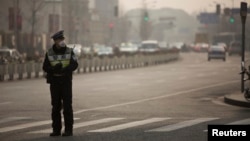BEIJING —
The Chinese government said on Wednesday said it will set up a 10 billion yuan [$1.65 billion] fund to fight air pollution, offering rewards for companies that clean up their operations.
Pollution is of increasing concern to China's stability-obsessed leaders, anxious to douse potential unrest as a more affluent urban population turns against a growth-at-all-costs economic model that has poisoned much of the country's air, water and soil.
Authorities have issued countless orders and policies to try and clean up the country and invested in various projects to fight pollution and empowered courts to mete out the death penalty in serious cases.
But enforcement of rules has been patchy at the local level, where authorities often rely on taxes paid by polluting industries.
Premier Li Keqiang, at a cabinet meeting, said the central government would set up the 10 billion yuan fund to “use rewards to replace subsidies to fight air pollution in key areas”, the government said in a statement.
Companies which were considered leaders in their field at cleaning up their emissions would be given “incentives”, it added, without providing details.
The government said China had already made progress towards tackling smog.
“But the issue of air pollution has been forming for a long time, and we must recognize the serious nature of tackling this and must persevere unremittingly,” it said.
The government would continue to push energy efficiency and clean energy schemes, including improving gasoline standards for vehicles, and the phasing out of outdated equipment and factories, the statement added.
It said that the government would also keep on “perfecting” the oversight role of environmental protection bodies and “standardize” the release of public information about pollution.
Many Chinese cities have once again been choked by smog this winter, with the problem unusually acute in the cosmopolitan commercial hub of Shanghai.
China could grant its undersized environment ministry new powers over resources, possibly allowing it to veto projects, and more muscle to punish polluters as part of a government shake-up next month, sources told Reuters.
Pollution is of increasing concern to China's stability-obsessed leaders, anxious to douse potential unrest as a more affluent urban population turns against a growth-at-all-costs economic model that has poisoned much of the country's air, water and soil.
Authorities have issued countless orders and policies to try and clean up the country and invested in various projects to fight pollution and empowered courts to mete out the death penalty in serious cases.
But enforcement of rules has been patchy at the local level, where authorities often rely on taxes paid by polluting industries.
Premier Li Keqiang, at a cabinet meeting, said the central government would set up the 10 billion yuan fund to “use rewards to replace subsidies to fight air pollution in key areas”, the government said in a statement.
Companies which were considered leaders in their field at cleaning up their emissions would be given “incentives”, it added, without providing details.
The government said China had already made progress towards tackling smog.
“But the issue of air pollution has been forming for a long time, and we must recognize the serious nature of tackling this and must persevere unremittingly,” it said.
The government would continue to push energy efficiency and clean energy schemes, including improving gasoline standards for vehicles, and the phasing out of outdated equipment and factories, the statement added.
It said that the government would also keep on “perfecting” the oversight role of environmental protection bodies and “standardize” the release of public information about pollution.
Many Chinese cities have once again been choked by smog this winter, with the problem unusually acute in the cosmopolitan commercial hub of Shanghai.
China could grant its undersized environment ministry new powers over resources, possibly allowing it to veto projects, and more muscle to punish polluters as part of a government shake-up next month, sources told Reuters.





